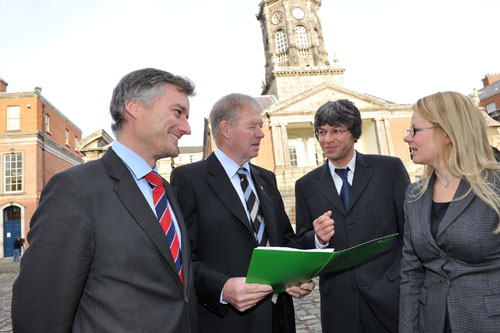All Ireland Conference on Ageing Highlights Positive Contributions Older People Make in Society
Posted on: 23 November 2010
What will it be like to live in societies that are much older than we have ever known? Are older people able to shape the communities and care settings in which they live? Are they able to participate in making decisions that influence their lives? These and other questions were discussed recently at a conference titled, “Becoming Visible: Older People as Active Participants in the Community and in Long-term Care Settings”, opened by sports commentator, Micheál Ó Muircheartaigh.
The conference was organised by the Social Policy and Ageing Research Centre (SPARC), School of Social Work and Social Policy, Trinity College Dublin, in partnership with the Changing Ageing Partnership (CAP), Queen’s University Belfast and Age NI.
The conference aimed to draw attention to the real inputs and positive contributions that older people make in society. In attendance at the conference were older people and representatives from older people’s interest groups, individuals working in the ageing sector, policymakers, and researchers.

Pictured at the conference were Paddy Prendergast, TCD, Micheál Ó Muircheartaigh, Professor James Nazroo, University of Manchester, and Dr Virpi Timonen, TCD.
While a growing number of older people in Ireland participate in paid work, older people also play a vital role in the community. Many grandparents provide care to grandchildren. Older people play a very important role in caring for one another when disability or illness strikes. Older people contribute to society through volunteering.
“Older people’s participation in decision-making is important especially when it involves policies and practices that directly affect their lives. What say do older people living in long-term care settings have in their care? In the Republic of Ireland and Northern Ireland, the nursing home standards talk about older people participating in nursing homes. But what does this mean in practice? What kinds of policies and practices do we need to better engage older people, including people with dementia, living in long-term care settings?” commented Dr Virpi Timonen, Director, Social Policy and Ageing Research Centre, Trinity College Dublin.
Keynote speakers at the conference included Professor James Nazroo, University of Manchester; Maev-Anne Wren, award-winning journalist and author; Professor Marian Barnes, University of Brighton; and Eleanor Edmond, Alzheimer Society of Ireland. The conference closed with a poetry reading by award-winning poet, Professor Eiléan Ní Chuilleanáin.
Maev-Ann Wren, an award-winning journalist and author, presented her research, which highlights that the convergence of life expectancies between men and women means that widowhood will become less common. Couples caring for each other in later life leads to a reduced need for residential care and the use of acute hospital care. While this is to be welcomed, Maev-Ann Wren also pointed out that it “reinforces the need to plan for and resource significant support for the care of older people in their homes”.
Eleanor Edmund, Alzheimer’s Society of Ireland, spoke about the factors that get in the way of an older person’s voice being heard. Speaking about people with dementia, she noted that the “stigma about dementia means that a person with dementia is less likely to speak up, their listeners are more likely to assume that what they have to say is unreliable”, an assumption that is often widespread in society. Edmund explored the potential ways of enabling older people’s voices to be heard drawing on examples from existing initiatives and practices.
In addition to the plenary sessions, research was showcased during parallel sessions, running over the two days of the conference. Topics covered included civic engagement and active ageing, prevention of loneliness, and service user involvement in nursing homes.
